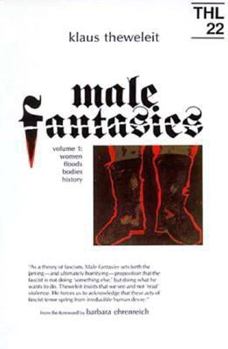Male Fantasies: Volume 1: Women Floods Bodies History Volume 1
(Book #1 in the Männerphantasien Series)
Select Format
Select Condition 
Book Overview
No Synopsis Available.
Format:Paperback
Language:English
ISBN:0816614490
ISBN13:9780816614493
Release Date:April 1987
Publisher:University of Minnesota Press
Length:544 Pages
Weight:0.88 lbs.
Dimensions:1.2" x 6.0" x 9.0"
Customer Reviews
3 ratings
Eye-Opening Cultural Study, both in method and results.
Published by Thriftbooks.com User , 20 years ago
Male Fantasies is a book I wish many, many people would read. The writing is long-winded, the author's ideas are sometimes (in Volume II) flaky, but the content of the book is too good for this to matter. Theweleit studies the art and literature of a particular group of men--the Freikorps--who were essentially disaffected former soldiers in Germany after the First World War. These men developed their own groups and their own culture, and became the firsts-in-line to man Hitler's new army in the '30s (the Brown Shirts and Black Shirts). What is so fascinating about this book is that it approaches the study of this group by looking at the images of women in their writings. Initially, the author goes in great detail over letters these men wrote; then he looks at their magazines and novels. It turns out that through their images of women, a whole vision of human personal and political reality can be decoded. A particular vision of women (a complex typology of types of women: the mother, the sister, the white nurse, the red nurse, etc.) turns out to be intimately interwoven with a fascist approach to human life--AND this vision turns out to be the core of a great deal of our own imagery and political self-perception. The first 225 pages of Book I are the crucial part to read, and then you can skip around through the rest of Volumes I and II as you see fit. The discussion of Freud and Medusa in this section and the discussion of the notions of deterritorialization and reterritorialization in the work of Deleuze and Guattar are specially valuable segments. This book is also a good introduction to some important Weimar-era history, especially regarding Rosa Luxemburg and the Spartacists. I recommend this book to anyone in the humanities and to any generally intellectually minded adult. If you take the time to get into it, it will change your perception of some important things.
Richly and persuasively detailed history
Published by Thriftbooks.com User , 24 years ago
A deeply felt and extensively documented look at the lives and times of these men in Weimar Germany. The author looks unflinching at the Freikorps men, precursors of the Nazis, with all that they have very different from most of us today--and all they have that is all too common with us today. But here I am stressing the conclusion. The point is, he honestly gets his conclusions out of huge amounts of documentation on everyday life. These men represent an extreme, of course, but their motives and life-conditions were very close to many people in the Weimar Republic. It is a great book on that period, which also relates that time to our own.
fascism is psychoanalysis in reverse
Published by Thriftbooks.com User , 27 years ago
Examines fascism as a Reichian phenomenon gone awry - the fascist male experiences ego-dissolution in early infancy, finds it threatening, and so builds for himself a "body armor" within which are contained such "female" traits and emotions (unaknowledged) as weakness, fear, guilt, etc. Through repetitive conditioning and a brutal pedagogy, these negative, shadowy perceptions are then projected outward onto the despised classes of scoiety and made to represent the chaotic forces of the collective cultural unconscious. Like Adorno said, "fascism is psychoanalysis in reverse."






